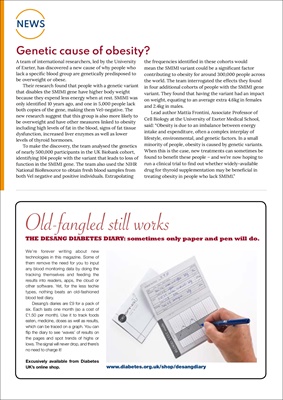
12
NEWS
GOING SOMEWHERE?
Old-fangled still works
We're forever writing about new
technologies in this magazine. Some of
them remove the need for you to input
any blood monitoring data by doing the
tracking themselves and feeding the
results into readers, apps, the cloud or
other software. Yet, for the less techie
types, nothing beats an old-fashioned
blood test diary.
Desang's diaries are £9 for a pack of
six. Each lasts one month (so a cost of
£1.50 per month). Use it to track foods
eaten, medicine, doses as well as results,
which can be traced on a graph. You can
flip the diary to see 'waves' of results on
the pages and spot trends of highs or
lows. The signal will never drop, and there's
no need to charge it!
Excusively available from Diabetes
UK's online shop.
THE DESANG DIABETES DIARY: sometimes only paper and pen will do.
www.diabetes.org.uk/shop/desangdiary
Genetic cause of obesity?
A team of international researchers, led by the University
of Exeter, has discovered a new cause of why people who
lack a specific blood group are genetically predisposed to
be overweight or obese.
Their research found that people with a genetic variant
that disables the SMIM1 gene have higher body weight
because they expend less energy when at rest. SMIM1 was
only identified 10 years ago, and one in 5,000 people lack
both copies of the gene, making them Vel-negative. The
new research suggest that this group is also more likely to
be overweight and have other measures linked to obesity
including high levels of fat in the blood, signs of fat tissue
dysfunction, increased liver enzymes as well as lower
levels of thyroid hormones.
To make the discovery, the team analysed the genetics
of nearly 500,000 participants in the UK Biobank cohort,
identifying 104 people with the variant that leads to loss of
function in the SMIM1 gene. The team also used the NIHR
National BioResource to obtain fresh blood samples from
both Vel negative and positive individuals. Extrapolating
the frequencies identified in these cohorts would
mean the SMIM1 variant could be a significant factor
contributing to obesity for around 300,000 people across
the world. The team interrogated the effects they found
in four additional cohorts of people with the SMIM1 gene
variant. They found that having the variant had an impact
on weight, equating to an average extra 4.6kg in females
and 2.4kg in males.
Lead author Mattia Frontini, Associate Professor of
Cell Biology at the University of Exeter Medical School,
said: "Obesity is due to an imbalance between energy
intake and expenditure, often a complex interplay of
lifestyle, environmental, and genetic factors. In a small
minority of people, obesity is caused by genetic variants.
When this is the case, new treatments can sometimes be
found to benefit these people - and we're now hoping to
run a clinical trial to find out whether widely-available
drug for thyroid supplementation may be beneficial in
treating obesity in people who lack SMIM1."